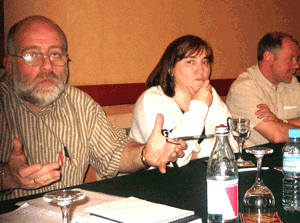 Saba Tsitsikashvili, Gori
Saba Tsitsikashvili, Gori
“Separatist Ossetians,” “aggressor Russians”… “Looters and ugly Northern enemies…” these are the common terms most often used in the articles published by Georgian media sources or various TV programs. Georgian conflict resolution and media experts take exception and condemn this tendency as being inappropriate and point out that activities of journalist should serve a purpose of preventing conflicts and not escalation – adding fuel to the fire.
“Language of hatred in Georgian media sources”-this was the title of topics of the meeting of journalists from Kakheti and Kartli region that was recently held in Sighnaghi. It was learned that Georgian media companies and newspapers were not more polite than what was the Russian media in reporting the recent war.
Public Information Department of the Office of UN Human Rights High Commissioner in Georgia organized the meeting of journalists. The training was arranged for media representatives working in the sphere of human rights.
The invited experts were Vladlen Stephanov, advisor in chief of the UN Human Rights High Commissioner in the South Caucasus; Ia Antadze, journalist of the Radio Liberty and member of the council of the institution for civil development; Giorgi Tughushi, member of the Committee against Torture within Council of Europe; journalist Zviad Koridze; Maia Kurtsikidze, communication officer at the UNICEF; Tamar Sabedashvili, gender advisor at the UN Development Fund for Women.
While participants discussed the language of hatred, stereotypes and war journalists were shown the documentary film about the ethnic cleansing in Ramada, Africa. The film is based on documentary materials and the appeals and items prepared by Ramada radio stations are used in it. The film demonstrated that ethnic cleansing in Ruanda was encouraged by those same materials and public appeals that were announced on various radio stations.
Ia Antadze stated that it is important to find out in Georgian media where the border of ethics is drawn for journalists? Or which information serves public interest and what is interesting for greater society?
Ia Antadze: “Today it is time for us to raise questions. Today the state of the Georgian mass media is in a very dire condition. Central media sources are controlled by the authority and only several journalists are able to manage to maintain a degree of independence. So I think in such situation we should ask these questions from the regional media sources. I am completely sure that regional media is an oasis for Georgian media. If there is anything valuable in our country today it is regional media. Journalists and owners of regional media sources are absolutely independent. I mean journalists and editors of local newspapers. As for the owners of the regional TV companies, we have good relationships with them and I hope they will also manage to protect maximum quality of journalist independence and responsibility.”
Expert Zviad Koridze considers hat well-estimated stereotypes in Georgian media must be discussed. He paid attention to the phrases that were used by Georgian journalists mentioning Ossetian or Russian people – and how these are described as “separatists, looting Ossetians”…”looting Russian occupants…” etc.
Zviad Koridze considers that before August 2008 Georgian media carried out an anti-Ossetian campaign. After the war it turned into anti-Russian campaign. “We should not try to win Russians in using insulting words, or in blaming each other, but we should try to estimate exactly what are the facts. We should also discuss how well we can rely on the journalist who witnessed this, or some other fact.”
Thea Tedliashvili (journalist for Kartlis Khma): When years ago the editorial office of New-York Times burnt down in the united journalists of the same newspaper wrote article that was based on the stories of witnesses and police reports. Journalists of the New York Times managed to interview several eye-witnesses in order to make their story more convincing. By the way, more than half journalists of the newspaper witnessed the fire but none of them were interviewed. This fact demonstrates that a journalist should try to collect as much evidence as possible from the public. Many witness journalists were often mentioned in the articles written about the war who continuously reported the society about Ossetian looters and robbers as well as the Russian attackers. For example, I could easily believe the story of the journalist who would represent two or three people who had witnessed the same as the journalist.”
Eka Kupatadze, journalist who works in Kakheti, stated that stereotype such as “we are Georgians and that means we should write as much bad about Ossetians and Russians as possible, while we should on the other hand praise the Georgian authority. This attitude must be destroyed. Governmental officials use this moment to quiet journalists; they persuade people that authority must not be criticized during the war, as it supports our enemies, the Russians and Ossetians.
“I think journalist should refuse to be so “patriot” and provide the society with the truth in the information they provi8de. It will represent patriotism and reality,” said Eka Kupatadze.
“Fortunately much was written about the war operations in August in there foreign media. None of foreign journalists mentioned either Ossetian or Georgian or the Russian side as separatists, aggressors, looters, robbers etc. For example, British newspaper Guardian always used word Russian soldier or Russian army when speaking about Russians. They also used term-ethnic Ossetian; foreign reporters never stated that Russian aggressors attacked Georgia or that the Russians who are descendents of Temur-Leng.
International standard and journalistic responsibility are never compromised by undercurrents of ethnic origin. We, Georgian journalists often mention Ossetians as separatists; in such cases we forget that they are Ossetians who live in Georgian villages, and in our neighborhoods,” said participants of the meeting.
Regional journalists will meet again at the beginning of November.



